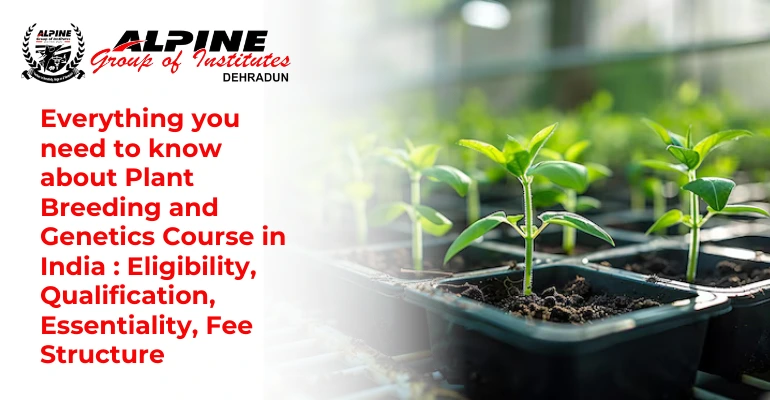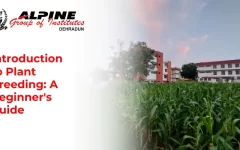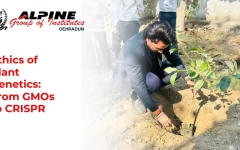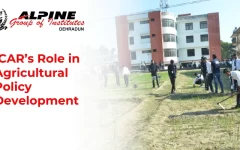Everything You Need to Know About Plant Breeding and Genetics Courses in India: Eligibility, Qualification, Essentiality, and Fee Structure
2024-12-16 9:30Everything You Need to Know About Plant Breeding and Genetics Courses in India: Eligibility, Qualification, Essentiality, and Fee Structure

Everything You Need to Know About Plant Breeding and Genetics Courses in India: Eligibility, Qualification, Essentiality, and Fee Structure
In a world where agricultural productivity is increasingly crucial to feeding a growing population, plant breeding and genetics have emerged as vital fields of study. These disciplines focus on enhancing crop traits like yield, disease resistance, and nutritional content, making them integral to sustainable agriculture.
What is Plant Breeding and Genetics?
Plant breeding and genetics are sub-disciplines within agricultural sciences aimed at improving crops.
- Plant Breeding focuses on selecting parent plants with desirable characteristics to create new generations with enhanced traits like higher yield, disease resistance, and better adaptation to environmental stress.
- Genetics studies the inheritance patterns of traits in plants. It helps us understand how genetic material (DNA) passes from one generation to the next, making it an essential tool in the development of new crop varieties.
Together, these disciplines contribute to the advancement of agricultural practices and food security, addressing challenges like climate change, pest attacks, and population growth.
Eligibility for Plant Breeding and Genetics Courses in India
The eligibility requirements for plant breeding and genetics programs in India vary by level of study (undergraduate, postgraduate, and doctoral). Below are the general criteria:
- Undergraduate Programs (B.Sc./B. Tech in Agriculture or Plant Breeding)
Eligibility:
- Candidates should have completed their 10+2 education with subjects like Biology, Chemistry, and Physics/Mathematics.
- A minimum of 50% marks (can vary by institution) in the qualifying exam.
- Duration:
- Typically 3-4 years.
- Postgraduate Programs (M.Sc./M. Tech in Plant Breeding and Genetics)
Eligibility:
- A Bachelor’s degree (B.Sc./B.Tech) in Agriculture, Horticulture, Botany, Plant Science, or related fields.
- A minimum of 50-60% aggregate marks in undergraduate studies (varies by institution).
- Some universities may require candidates to pass an entrance exam (e.g., ICAR, AIEEA PG).
- Duration:
- 2 years.
- Doctoral Programs (Ph.D. in Plant Breeding and Genetics)
Eligibility:
- A Master’s degree (M.Sc./M.Tech) in Plant Breeding, Genetics, Agriculture, or related fields.
- A minimum of 55% marks (can vary) in postgraduate studies, along with relevant research experience.
- Duration:
- 3-5 years.
Why is Plant Breeding and Genetics Essential?
The importance of plant breeding and genetics cannot be overstated, especially when we look at its applications in real-world challenges.
- Increased Crop Yield: Plant breeding helps develop crop varieties that produce higher yields, addressing the need for more food to feed the increasing global population.
- Disease Resistance: Genetic improvements help crops become resistant to diseases and pests, which reduces the dependency on harmful chemicals like pesticides and ensures food security.
- Environmental Resilience: Through genetic modifications, plants can be bred to withstand extreme environmental conditions such as drought, floods, and high temperatures, which are becoming more frequent due to climate change.
- Enhanced Nutritional Value: Plant breeders are working to improve the nutritional content of crops, making them more beneficial to human health, such as developing iron-rich or vitamin-packed varieties.
- Sustainable Agriculture: By creating crops that require fewer inputs (like water and fertilizers) and are more resilient to environmental stresses, plant breeding promotes more sustainable and eco-friendly agricultural practices.
Fee Structure for Plant Breeding and Genetics Courses in India
The cost of education in plant breeding and genetics varies depending on the type of institution (public vs. private) and the level of the program. Below is an overview of the fee structure for these courses in India:
- Undergraduate Programs (B.Sc./B. Tech) in Agriculture or Plant Breeding
- Public Universities:
The fees for government-run institutions typically range from ₹20,000 to ₹50,000 per year. These universities offer affordable education with quality facilities. - Private Universities:
Private institutions charge higher fees, typically ranging from ₹50,000 to ₹2,00,000 per year, depending on the infrastructure and reputation of the university.
- Public Universities:
- Postgraduate Programs (M.Sc./M. Tech) in Plant Breeding and Genetics
- Public Universities:
Fees for M.Sc. or M. Tech programs in government institutions generally range from ₹30,000 to ₹1,00,000 per year. - Private Universities:
Fees can be higher in private institutions, typically ranging from ₹1,00,000 to ₹3,00,000 per year.
- Public Universities:
- Doctoral Programs (Ph.D.) in Plant Breeding and Genetics
- Public Universities:
The fee structure for Ph.D. programs is relatively lower, ranging from ₹20,000 to ₹1,50,000 annually in government institutions. - Private Universities:
Private institutions may charge anywhere between ₹1,00,000 and ₹5,00,000 per year for Ph.D. programs.
- Public Universities:
Note that these figures are approximations and can vary based on the institution, location, and available scholarships. Some institutions may also offer financial aid or fellowships, particularly for postgraduate and doctoral candidates.
Career Opportunities After Plant Breeding and Genetics Courses
Plant breeding and genetics open up a wide range of career options, both in India and globally. Graduates of these courses can pursue careers in:
- Plant Breeder: Develop new crop varieties with superior traits like higher yield, pest resistance, and better nutritional content.
- Geneticist: Work on genetic analysis and modification of plants, using molecular biology techniques to improve plant traits.
- Agricultural Consultant: Provide expert advice to farmers, agricultural companies, and government organizations on improving crop production and sustainability.
- Biotech Researcher: Work in biotechnology firms, applying genetic and molecular techniques to develop genetically modified (GM) crops or biotechnological solutions for agriculture.
- Academic and Research Careers: Pursue further research in universities or research institutions, contributing to advancements in plant genetics, breeding, and biotechnology.
- Seed Industry Professional: Work with seed companies to develop and market improved seed varieties that benefit farmers and consumers alike.
- Agricultural Extension Officer: Work with rural communities to promote the adoption of modern agricultural practices based on plant breeding and genetics.
Key Skills Acquired in Plant Breeding and Genetics Courses
Students pursuing plant breeding and genetics develop a diverse skill set, which includes:
- Genetic Analysis and Molecular Biology: Proficiency in DNA sequencing, PCR (Polymerase Chain Reaction), genetic mapping, and gene editing techniques.
- Statistical Analysis: Ability to use statistical tools to analyze breeding data, making predictions about traits and yields.
- Research Methodology: Strong skills in conducting experiments, field trials, and lab research to develop new plant varieties.
- Problem Solving: Critical thinking and problem-solving skills, essential for tackling the challenges in crop improvement.
- Fieldwork and Laboratory Skills: Hands-on experience in breeding trials, crop evaluation, and laboratory experiments.
Conclusion
Pursuing a course in plant breeding and genetics in India offers exciting career prospects in agriculture, biotechnology, and research. With the eligibility criteria clearly outlined for undergraduate, postgraduate, and doctoral programs, prospective students can find a path that suits their academic background and interests. While the fee structure varies, the investment in education pays off in the form of high-impact careers in a rapidly evolving field that is essential for ensuring global food security, environmental sustainability, and agricultural productivity.








